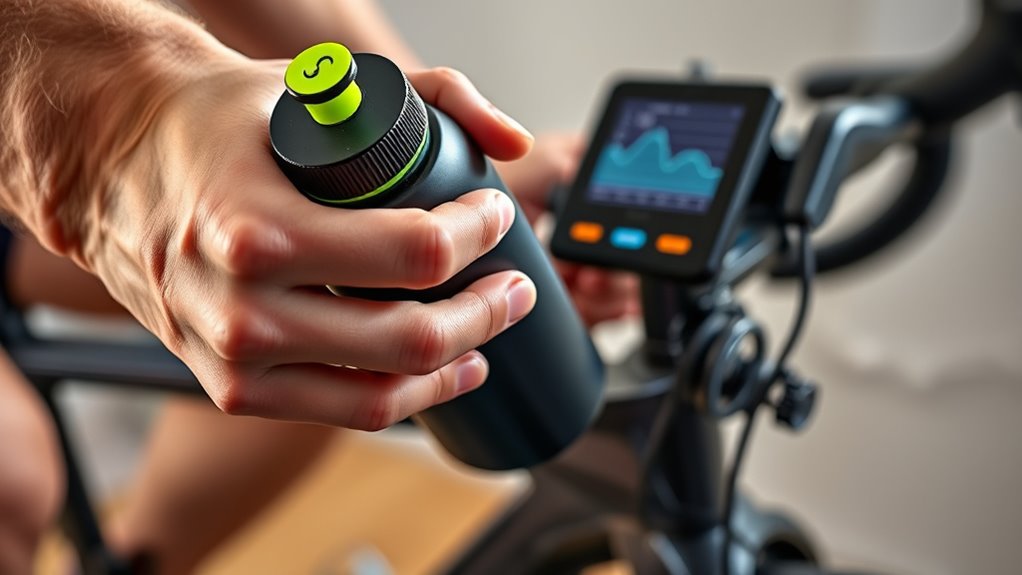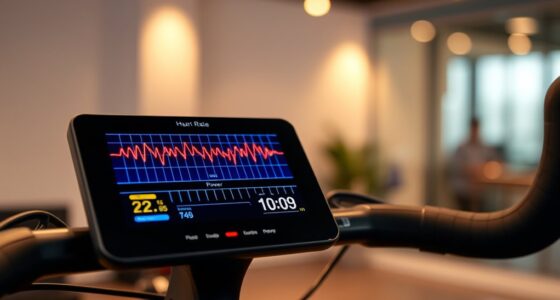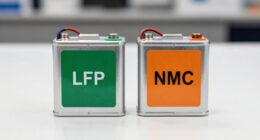To boost your FTP test, consume caffeine about 30-60 minutes beforehand for maximum alertness and endurance. This timing guarantees caffeine peaks in your bloodstream, blocking fatigue signals and improving focus. Use about 3-6 mg per kg of your body weight, but adjust based on how your body responds. Choosing plain coffee or espresso helps avoid unwanted additives. If you keep these tips in mind, you’ll maximize your performance and stay on top during the test. Keep going to learn more.
Key Takeaways
- Consume caffeine 30-60 minutes before the FTP test to align with peak absorption and maximize alertness and endurance benefits.
- Adjust timing based on individual response; some may benefit from 30-minute pre-test intake, others may need up to 45 minutes.
- Use 3-6 mg/kg body weight dosage to optimize performance while minimizing side effects, timing intake accordingly.
- Avoid taking caffeine too early or too late; aim for the window where effects are strongest during the test.
- Consistent pre-test caffeine timing helps you monitor effects and personalize your strategy for maximum FTP improvement.
Understanding How Caffeine Enhances Performance
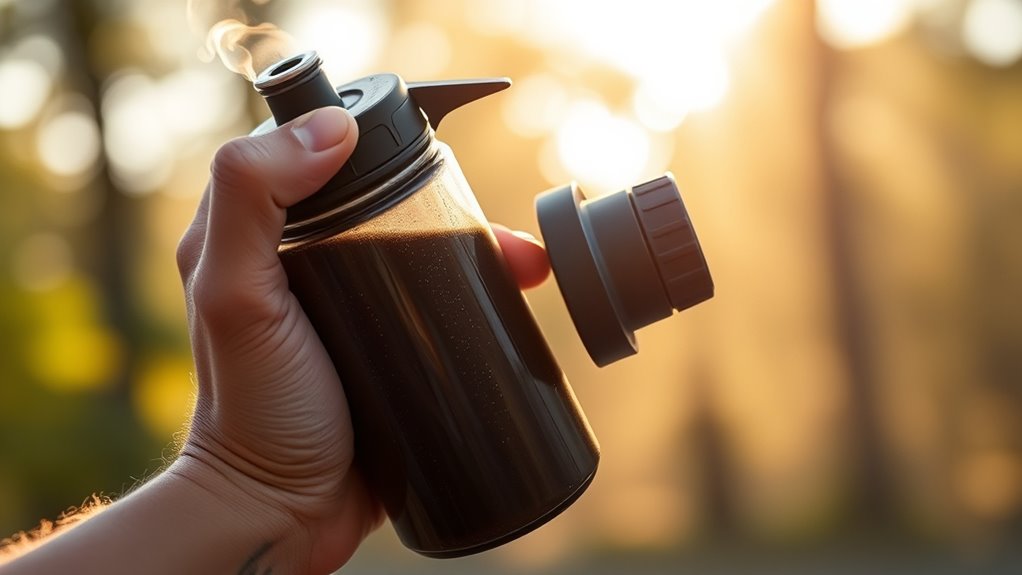
Caffeine is well-known for its ability to improve athletic performance, and understanding how it works can help you optimize its benefits. When you consume caffeine, it quickly enters your bloodstream and influences caffeine metabolism, leading to increased levels of alertness. Caffeine’s mechanism of action involves blocking adenosine receptors in your brain, preventing fatigue signals and making you feel more awake and energized. This boost in mental alertness enhances focus, reduces perceived effort, and can improve your overall performance during FTP tests. Caffeine’s effects on muscle fatigue can contribute to improved endurance during high-intensity efforts. Additionally, the timing of caffeine intake can influence its effectiveness in performance enhancement. By understanding these effects, you can better harness caffeine’s ability to sharpen your mental focus and maximize your performance during critical testing moments. Incorporating professional equipment into your routine ensures clear communication and consistent results.
The Optimal Time to Consume Caffeine Before Testing
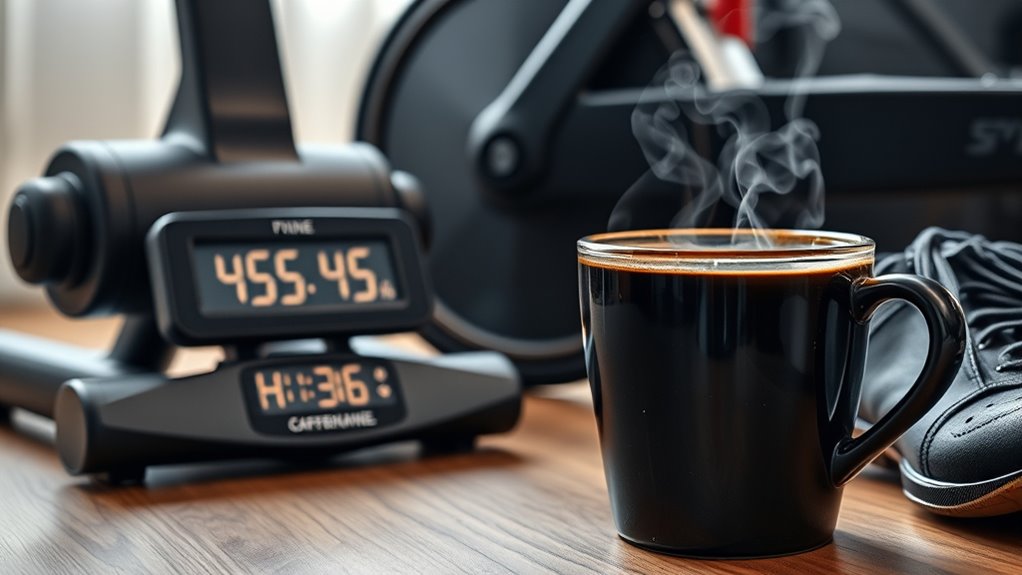
To get the most benefit from caffeine before your FTP test, you need to contemplate how quickly your body absorbs it and when it peaks. Your ideal timing depends on your personal tolerance and how your body responds to caffeine intake. Knowing these factors can help you determine the best moment to consume caffeine for maximum performance. Additionally, considering the optimal brewing temperature for tea might be analogous to understanding the precise timing needed for caffeine absorption. Recognizing the Vetted – Halloween Product Reviews can also inform you about trusted sources for caffeine products that meet safety and quality standards. Understanding the tuning options for performance enhancement can further help you customize your approach for optimal results. Monitoring the AI security developments can provide insights into emerging safety measures that might influence the quality and safety of caffeine products.
Caffeine Absorption Timing
Timing is crucial when it comes to maximizing caffeine’s performance benefits before an FTP test. To do this effectively, you need to understand caffeine absorption timing. After ingestion, caffeine’s absorption rate influences how quickly it enters your bloodstream, affecting when you’ll feel its effects. Typically, caffeine metabolism allows for rapid absorption within about 30 to 60 minutes, but this can vary based on individual factors like body weight and tolerance. To optimize your performance, consume caffeine roughly 30 to 60 minutes before your test, aligning with peak absorption. This window ensures caffeine is at its most effective, boosting alertness and reducing perceived effort during the effort. Monitoring your own response can help fine-tune the timing for maximum impact.
Peak Performance Window
Have you ever wondered when is the best moment to consume caffeine before an FTP test? The peak performance window typically occurs about 30 to 60 minutes after ingestion, aligning with ideal caffeine metabolism. During this period, caffeine’s effects on alertness and focus are heightened, maximizing endurance benefits. Consuming caffeine within this window ensures you’re leveraging its ability to reduce perceived effort and delay fatigue at the right moment. Timing it too early may cause effects to fade before the test, while too late might not allow enough time for absorption. To get the most out of caffeine’s performance boost, plan your intake so that the peak coincides with your test start, helping you sustain effort and improve your FTP results.
Personal Tolerance Factors
Since everyone’s response to caffeine varies, understanding your personal tolerance is key to optimizing its benefits before an FTP test. Your individual sensitivities and habitual consumption influence how caffeine affects you. To find your ideal timing, consider these factors:
- Sensitivity Level: If you’re highly sensitive, consume caffeine closer to your test—about 30-45 minutes prior—to avoid jitters or anxiety. Knowing your caffeine sensitivity can help you fine-tune your intake for maximum benefit. Additionally, understanding your metabolic rate can influence how quickly caffeine is processed in your body. Recognizing your response to caffeine can help optimize your performance, especially when combined with other pre-test strategies.
- Habitual Use: Regular caffeine consumers may need a slightly higher dose or longer interval, as their bodies adapt.
- Reaction Time: Monitor how quickly you feel the effects after intake; some notice benefits in 20 minutes, others closer to 60.
- Personal Tolerance Variability: As shown in family photoshoot fails, individual reactions can be unpredictable, making it essential to test and adjust your caffeine timing accordingly.
Knowing these personal tolerance factors helps tailor your caffeine intake, ensuring peak performance during your FTP test.
Dosage Recommendations for Maximum Effectiveness
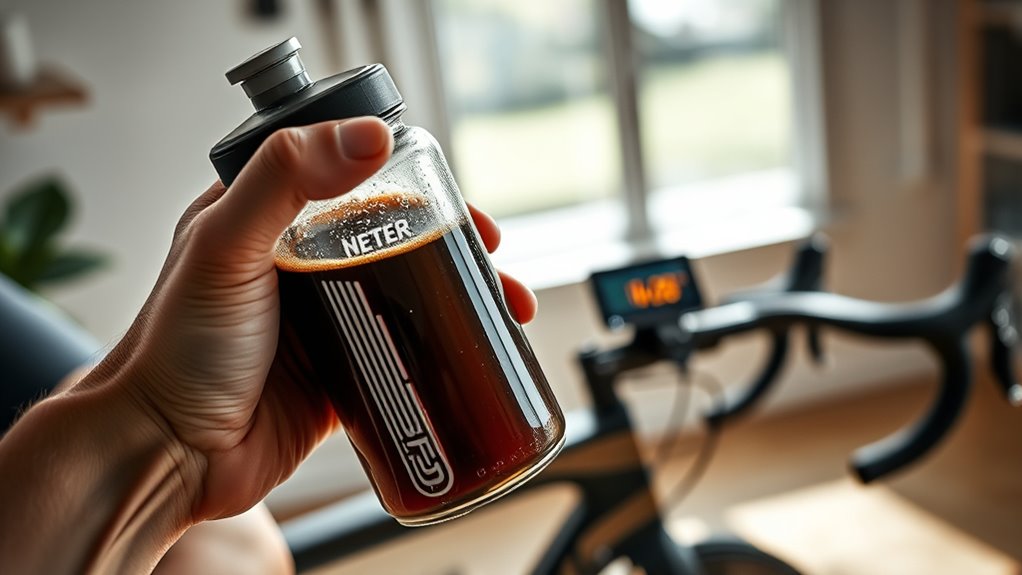
To achieve maximum effectiveness, it’s important to optimize your caffeine dosage before an FTP test. The ideal caffeine dosage for performance optimization generally falls between 3 to 6 milligrams per kilogram of body weight. Starting with around 3 mg/kg allows you to assess your response with minimal side effects, while up to 6 mg/kg can provide a stronger boost if tolerated. Avoid exceeding this range, as too much caffeine may cause jitters, increased heart rate, or discomfort, negatively impacting your test. Caffeine tolerance varies among individuals, so adjusting accordingly after testing different amounts during training, not on race day, is essential for optimal results. Consistency in the timing and dosage helps you better gauge performance improvements and prevent adverse effects. Remember, individual tolerance varies, so adjust accordingly after testing different amounts during training, not on race day. Additionally, understanding your body’s response to caffeine can help tailor your intake for peak performance. Recognizing the importance of personalized approaches in supplementation can further enhance your training outcomes and reduce the risk of side effects. Incorporating knowledge about glycolic acid benefits from skincare science emphasizes the importance of personalized approaches, similar to adjusting caffeine intake for best results.
Types of Caffeinated Beverages Suitable for FTP Tests
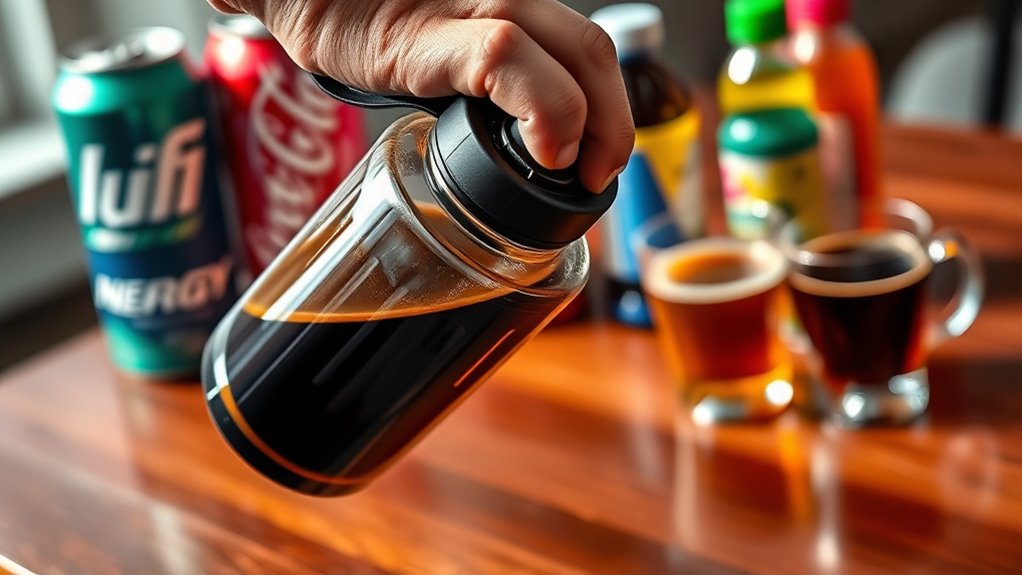
When choosing a caffeinated beverage for your FTP test, stick to options like black coffee or espresso that provide caffeine without added sugars or fats. These drinks deliver a quick caffeine boost while keeping your stomach light. Avoid beverages with cream, sugary syrups, or artificial additives that can cause discomfort or affect your performance. Incorporating brewing techniques can also help boost your confidence and motivation during the test.
Suitable Coffee Options
Choosing the right caffeinated beverage can considerably impact your FTP test performance. For ideal results, stick with options that provide consistent caffeine levels. First, black coffee is a popular choice, offering a natural caffeine boost without added sugars. Second, espresso provides a concentrated dose, making it easy to consume just before your test. Third, if you’re sensitive to caffeine or trying to avoid withdrawal symptoms, decaffeinated alternatives like decaf coffee or tea can help prevent caffeine withdrawal effects while still offering some flavor. Avoid excessive consumption, which can cause jitters. Remember, caffeine withdrawal symptoms can impair performance if you’re not a regular consumer. To avoid withdrawal symptoms, it’s important to consume caffeine regularly and in moderation. Regular intake can also help maintain steady energy levels, which are crucial for peak performance. Being mindful of toilet habits around your caffeine intake can help prevent discomfort or unexpected interruptions during your test. Choose beverages that suit your tolerance and timing to maximize benefits without adverse effects. Understanding caffeine effects can help you tailor your intake for optimal results.
Avoid Unwanted Additives
Avoiding unwanted additives in your caffeinated beverages guarantees you don’t compromise your FTP test performance. Additive avoidance helps ensure your drink contains only what you need—caffeine and perhaps a small amount of sugar—without unnecessary fillers or preservatives. Always prioritize ingredient transparency when selecting your beverage; read labels carefully to identify hidden additives like artificial flavors, sweeteners, or preservatives that can cause unwanted side effects or jitters. Opt for plain coffee, tea, or specially prepared caffeine sources that list only natural ingredients. This way, you maintain control over what you’re consuming and reduce the risk of digestive issues or inconsistent energy levels during your test. Clear ingredient transparency supports a clean, reliable caffeine intake, helping you perform at your best.
Potential Side Effects and How to Avoid Them

While caffeine can enhance your FTP test performance, it also has potential side effects that you should be aware of. One major concern is addiction risks, which can lead to dependence if you consume it regularly. Withdrawal symptoms, like headaches, fatigue, and irritability, may occur if you suddenly stop intake. To avoid these issues, consider the following:
Caffeine can boost performance but watch for dependence, withdrawal, and overuse; consume mindfully.
- Limit daily caffeine intake to moderate levels.
- Gradually reduce consumption rather than stopping abruptly.
- Pay attention to your body’s signals and avoid over-reliance on caffeine for performance gains.
Timing Caffeine Intake During the Test for Sustained Benefits
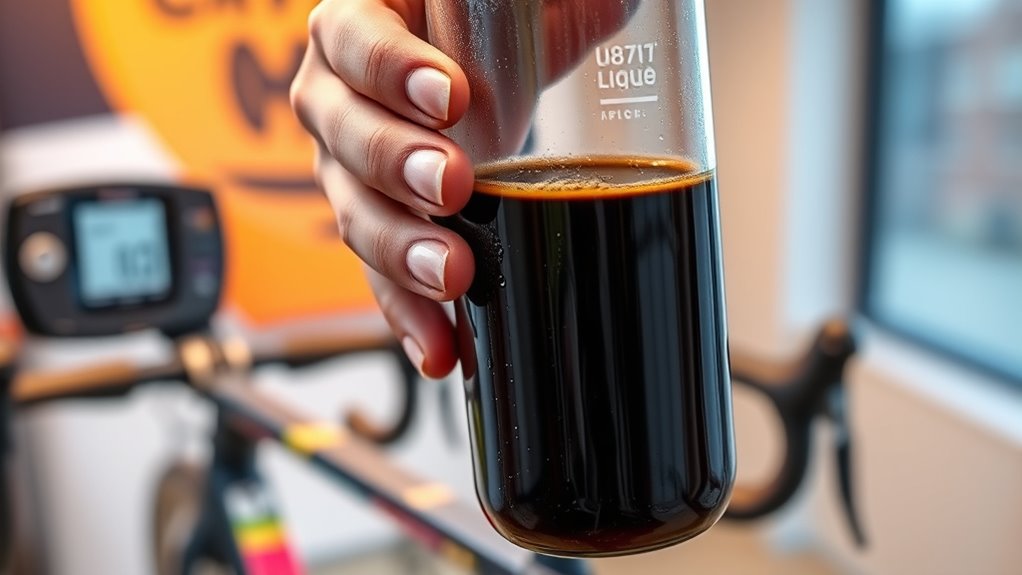
Timing your caffeine intake during the test can considerably influence its effectiveness. To maximize benefits, aim to consume caffeine when your caffeine metabolism is at its peak—usually about 30 to 60 minutes before starting. Consistent timing helps your body anticipate caffeine’s effects, leading to more reliable performance boosts. Avoid taking caffeine too early, which might cause it to wear off mid-test, or too late, risking jitteriness or delayed effects. It’s essential to maintain timing consistency across tests to track your response accurately. By aligning your caffeine intake with your metabolism and sticking to a set schedule, you ensure sustained benefits without unexpected side effects, optimizing your chances of setting a new FTP personal best.
Personalizing Your Caffeine Strategy for Best Results

Personalizing your caffeine strategy begins with understanding how your body responds to different dosages and timing. Since caffeine metabolism varies widely among individuals, your ideal dose and timing might differ from others. To optimize your results, consider these steps:
- Track your caffeine intake and performance during tests to identify your response pattern.
- Experiment with different dosages, noting how your body reacts and how quickly caffeine affects you.
- Adjust timing based on your caffeine metabolism speed, aiming for peak alertness during your FTP test.
Conclusion
By timing your caffeine intake just 30 to 60 minutes before your FTP test, you can boost your performance considerably. Studies show that caffeine can increase endurance by up to 15%, giving you that extra edge. Remember to stick to recommended dosages and personalize your approach to avoid side effects. With the right timing and strategy, you’ll maximize your results and push your limits further than ever before.
